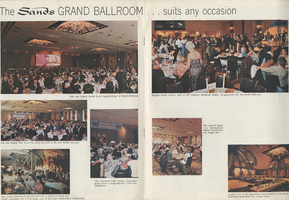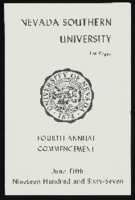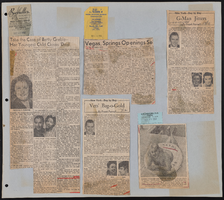Search the Special Collections and Archives Portal
Search Results

Interview with Marcell Eugene Bridges, June 12, 2004
Date
Archival Collection
Description
Text

Interview with Zenna Mae (Schmid) Bridges, June 12, 2004
Date
Archival Collection
Description
Text

14th Anniversary Issue of the Sands Times from the Sands Hotel and Casino, December 1966
Date
Archival Collection
Description
The 14th anniversary issue of the Sands Times magazine from the Sands Hotel and Casino in Las Vegas, Nevada. Articles written in the magazine describe various events held at the Sands, entertainment news, and celebrity appearances.
Mixed Content

Transcript of interview with George Levine by Barbara Tabach, April 16, 2015
Date
Archival Collection
Description
In this interview, George reflects upon his life in Las Vegas, particularly the period as ma?tre d? of the Sand?s Copa Room. Joined by his daughter - and former United States Democratic Congresswomen-Shelley Berkley, George shares stories of working in the gaming industry during this unique era, including those of Frank Sinatra and Wayne Newton. He also talks about his life as a professional gambler.
Born on February 28, 1925 in Sommerville, New Jersey, George Levine?s family moved to his childhood home, Manhattan?s Lower East Side, when he was six months old. George served on a United States Navy aircraft carrier for thirty months during World War II. After returning home, he met his first wife Estelle, with whom he had two daughters, and soon moved to Kiamesha Lake, New York to work at the Concord Resort Hotel. In 1963, George and his family moved to Las Vegas and took his first job at Mr. Sy?s Casino. Six months later he began waiting tables at the Sands Hotel and Casino. He worked his way up the ranks and was ma?tre d' from 1979 until the hotel closed in 1996.
Text
Benedict Family Papers
Identifier
Abstract
The Benedict Family Papers materials date from roughly 1905-1998 and are comprised of correspondence and letters (1969-1971) written to Howard Hughes by the public. The collection also contains correspondence written to Robert Maheu, former chief executive of Nevada operations for Howard Hughes. The collection also includes a variety of casino and gambling related product catalogs, gaming guides for Las Vegas casinos, and of research papers and reports primarily relating to sports betting and cheating.
Archival Collection

Nevada Southern University 4th commencement program
Date
Archival Collection
Description
Commencement program from University of Nevada, Las Vegas Commencement Programs and Graduation Lists (UA-00115).
Text
Eileen Brookman Photographs
Identifier
Abstract
The Eileen Brookman Photographs depict Nevada Assemblywoman Eileen Brookman from 1959 to 1989. The photographs primarily depict Brookman with other Nevada politicians, including U.S. Senators Harry Reid, Alan Bible, Eugene McCarty, and Howard Cannon, and Nevada Governors Paul Laxalt, Mike O’Callaghan, Richard Bryan, and Grant Sawyer. The photographs also depict Brookman at political events with the Nevada National Guard, bill-signing ceremonies, and at events in Las Vegas, Nevada.
Archival Collection


